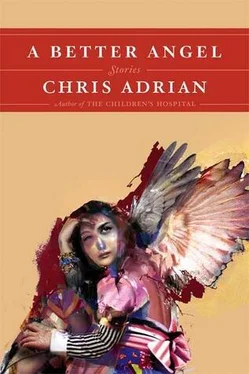Our cuteness has to work very hard here. It must extend itself to cover horrors — ostomies and scars and flipper-hands and harelips and agenesis of the eyeballs — and it rises to every miserable occasion of the sick body. Ella’s strange puffy face is covered, her yellow eyes are covered, her bald spot is covered, her extra fingers are covered, her ostomies are covered, and the bitter, nose-tickling odor of urine that rises from her always is covered by the tremendous faculty of cuteness generated from some organ deep within her. Watching faces, I can see how it’s working for her, and how it’s stopped working for me. Your organ fails, at some point — it fails for everybody, but for people like us it fails faster, having more to cover than just the natural ugliness of body and soul. One day you are more repulsive than attractive, and the goodwill of strangers is lost forever.
It’s a small loss. Still, I miss it sometimes, like now, walking down the hall and remembering riding down this same hall ten years ago on my big wheel. Strangers would stop me for speeding, and cite me with a hug. I can remember their faces, earnest and open and unassuming, and I wonder now if I ever met someone like that where I could go with them, after such a blank beginning. Something in the way that Dr. Chandra looks at me has that. And the Child Life people look at you that way, too. But they have all been trained in graduate school not to notice the extra head, or the smell, or the missing nose, or to love these things, professionally.
In the playroom I turn Ella over to Margaret and go sit on the floor in a patch of sun near the door to the deck. The morning activity, for those of us old enough or coordinated enough to manage it, is the weaving of God’s eyes. At home I have a trunkful of God’s eyes and potholders and terra-cotta sculptures the size of your hand, such a collection of crafts that you might think I’d spent my whole life in camp. I wind and unwind the yarn, making and then unmaking, because I don’t want to add anything new to the collection. I watch Ella playing at a water trough, dipping a little red bucket and pouring it over the paddles of a waterwheel. It’s a new toy. There are always new toys, every time I come, and the room is kept pretty and inviting, repainted and recarpeted in less time than some people wait to get a haircut, because some new wealthy person has taken an interest in it. The whole floor is like that, except where there are pockets of plain beige hospital nastiness here and there, places that have escaped the attentions of the rich. The nicest rooms are those that once were occupied by a privileged child with a fatal syndrome.
I pass almost a whole hour like this. Boredom can be a problem for anybody here, but I am never bored watching my gaunt, yellow peers splash in water or stacking blocks or singing along with Miss Margaret. Two wholesome Down syndrome twins — Dolores and Delilah Cutty, who both have leukemia and are often in for chemo at the same time I am in for the sauce — are having a somersault race across the carpet. A boy named Arthur who has Crouzon’s syndrome — the bones of his skull have fused together too early — is playing Chutes and Ladders with a girl afflicted with Panda syndrome. Every time he gets to make a move, he cackles wildly. It makes his eyes bulge out of his head. Sometimes they pop out — then you’re supposed to catch them up with a piece of sterile gauze and push them back in.
Margaret comes over, after three or four glances in my direction, noticing that my hands have been idle. Child Life specialists abhor idle hands, though there was one here a few years ago, named Eldora, who encouraged meditation and tried to teach us yoga poses. She did not last long. Margaret crouches down — they are great crouchers, having learned that children like to be addressed at eye level — and, seeing my God’s eye half finished and my yarn tangled and trailing, asks if I have any questions about the process.
In fact I do. How do your guts turn against you, and your insides become your enemy? How can Arthur have such a big head and not be a super-genius? How can he laugh so loud when tomorrow he’ll go back to surgery again to have his face artfully broken by the clever hands of well-intentioned sadists? How can someone so unattractive, so unavailable, so shlumpy, so low-panted, so pitiable, keep rising up, a giant in my thoughts? All these questions and others run through my head, so it takes me a while to answer, but she is patient. Finally a question comes that seems safe to ask. “How do you make someone not gay?”
See the peacock? He has crispy lung surprise. He has got an aching in his chest, and every time he tries to say something nice to someone, he only coughs. His breath stinks so much it makes everyone run away, and he tries to run away from it himself, but of course no matter where he goes, he can still smell it. Sometimes he holds his breath, just to escape it, until he passes out, but he always wakes up, even when he would rather not, and there it is, like rotten chicken, or old, old crab, or hippopotamus butt. He only feels ashamed now when he spreads out his feathers, and the only thing that gives him any relief is licking a moving tire — a very difficult thing to do .
Suffer, peacock, suffer!
It’s not safe to confide in people here. Even when they aren’t prying — and they do pry — it’s better to be silent or to lie than to confide. They’ll ask when you had your first period, or your first sex, if you are happy at home, what drugs you’ve done, if you wish you were thinner and prettier, or that your hair was shiny. And you may tell them about your terrible cramps, or your distressing habit of having compulsive sex with homeless men and women in Golden Gate Park, or how you can’t help but sniff a little bleach every morning when you wake up, or complain that you are fat and your hair always looks as if it had just been rinsed with drool. And they’ll say, I’ll help you with that bleach habit that has debilitated you separately but equally from your physical illness, that dreadful habit that’s keeping you from becoming more perfectly who you are. Or they may offer to teach you how the homeless are to be shunned and not fellated, or promise to wash your hair with the very shampoo of the gods. But they come and go, these interns and residents and attendings, nurses and Child Life specialists and social workers and itinerant tamale-ladies — only you and the hospital and the illness are constant. The interns change every month, and if you gave yourself to each of them they’d use you up as surely as an entire high school football team would use up their dreamiest cheerleading slut, and you’d be left like her, compelled by your history to lie down under the next moron to come along.
Accidental confidences, or accidentally fabricated secrets, are no safer. Margaret misunderstands; she thinks I am fishing for validation. She is a professional validator, with skills honed by a thousand hours of role playing — she has been both the querulous young lesbian and the supportive adult. “But there’s no reason to change,” she tells me. “You don’t have to be ashamed of who you are.”
This is a lesson I learned long ago, from my mother, who really was a lesbian, after she was a nun but before she was a wife. “I did not give it up because it was inferior to anything,” she told me seriously, the same morning she found me in the arms of Shelley Woo, my neighbor and one of the few girls I was ever able to lure into a sleep-over. We had not, like my mother assumed, spent the night practicing tender, heated frottage. We were hugging as innocently as two stuffed animals. “But it’s all right ,” she kept saying against my protests. So I know not to argue with Margaret’s assumption, either.
Читать дальше












